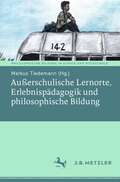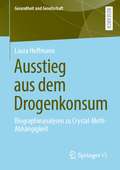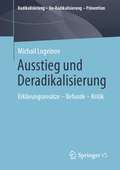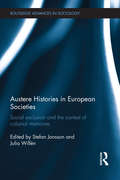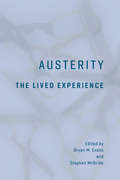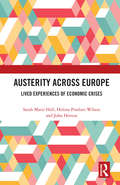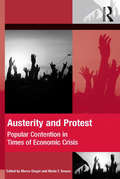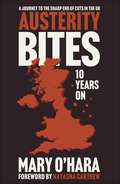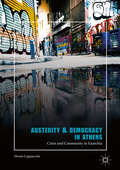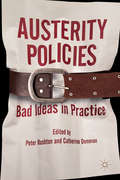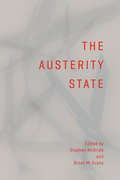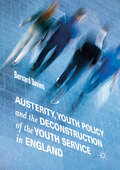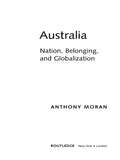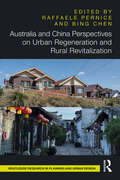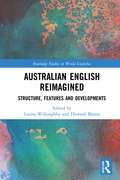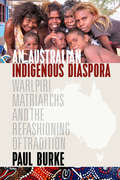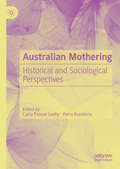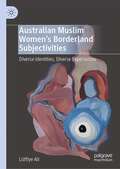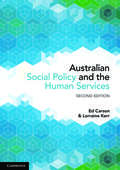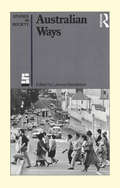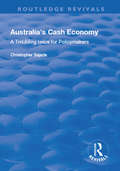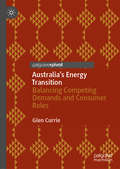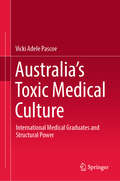- Table View
- List View
Außerschulische Lernorte, Erlebnispädagogik und philosophische Bildung (Philosophische Bildung in Schule und Hochschule)
by Markus TiedemannDie Fachdidaktik der Philosophie und Ethik fordert Problemorientierung und Lebensweltbezug. Exkursionen, außerschulische Lernorte oder ‚Outdoor Education‘ haben allerdings bisher kaum Berücksichtigung in der fachdidaktischen Forschung erfahren. Eine systematische Auslotung von möglichen Kooperationen, Synergieeffekten oder Unvereinbarkeiten wurde bisher nicht geleistet. Der vorliegende Band versucht diese Lücke zu schließen und eine erste Grundlage für weiterführende Forschungen, Erprobungen und Diskussionen zu schaffen. Er soll damit sowohl einen Beitrag zur Lehrerausbildung an Universitäten und Studienseminaren als auch für die fachdidaktische Explorationsforschung leisten.
Ausstieg aus dem Drogenkonsum: Biographieanalysen zu Crystal-Meth-Abhängigkeit (Gesundheit und Gesellschaft)
by Laura HoffmannIn der vorliegenden Arbeit werden erstmals Biographieverläufe von ehemaligen Methamphetaminkonsumenten im deutschsprachigen Raum untersucht und wichtige Erkenntnisse im Bereich der qualitativen Drogen- und Suchtforschung zur Verfügung gestellt. Es werden verschiedene biographische Prozesse identifiziert, die zum Drogenkonsum der Befragten geführt sowie zu dessen Bewältigung beigetragen haben. Die Ergebnisse der Studie deuten darauf hin, dass zukünftig die Individualität der Suchtverläufe der Betroffenen stärker in den Fokus gerückt werden muss, um verbesserte Hilfsangebote für verschiedene Phasen ihrer Abhängigkeit zur Verfügung stellen zu können. Auf diese Art und Weise können die Inanspruchnahme von Versorgungsangeboten sowie auch die Chancen auf eine gelingende Bewältigung des Drogenkonsums verbessert werden.
Ausstieg und Deradikalisierung: Erklärungsansätze – Befunde – Kritik (Radikalisierung – De-Radikalisierung – Prävention)
by Michail LogvinovUm Ausstieg und Deradikalisierung von Mitgliedern extremistischer Formationen auslösen, begleiten und unterstützen zu können, bedarf es eines fundierten Wirkfaktoren- und Prozessverständnisses. Daher befasst sich der zweite Band unserer Reihe mit der Post-9/11-Deradikalisierungsforschung, arbeitet relevante Modelle sowie Befunde heraus und formuliert praktische und theoretische Implikationen.
Austere Histories in European Societies: Social Exclusion and the Contest of Colonial Memories (Routledge Advances in Sociology)
by Stefan Jonsson and Julia WillénIn recent years European states have turned toward more austere political regimes, entailing budget cuts, deregulation of labour markets, restrictions of welfare systems, securitization of borders and new regimes of migration and citizenship. In the wake of such changes, new forms of social inclusion and exclusion appear that are justified through a reactivation of differences of race, class and gender. Against this backdrop, this collection investigates contemporary understandings of history and cultural memory. In doing so, the reader will join the leading European contributors of this title in examining how crisis and decline in contemporary Europe trigger a selective forgetting and remodelling of the past. Indeed, Austere Histories in European Societies breaks new paths in scholarship by synthesising and connecting current European debates on migration, racism and multiculturalism. In addition to this, the authors present debates on cultural memory and the place of the colonial legacy within an extensive comparative framework and across the boundaries of the humanities and social sciences. This book will appeal to scholars and students across the social sciences and humanities, particularly in European studies, memory studies, sociology, postcolonial studies, migration studies, European history, cultural policy, cultural heritage, economics and political theory.
Austerity: The Lived Experience
by Bryan Evans Stephen McbrideBryan M. Evans, Stephen McBride, and their contributors delve further into the more practical, ground-level side of the austerity equation in Austerity: The Lived Experience. Economically, austerity policies cannot be seen to work in the way elite interests claim that they do. Rather than soften the blow of the economic and financial crisis of 2008 for ordinary citizens, policies of austerity slow growth and lead to increased inequality. While political consent for such policies may have been achieved, it was reached amidst significant levels of disaffection and strong opposition to the extremes of austerity. The authors build their analysis in three sections, looking alternatively at theoretical and ideological dimensions of the lived experience of austerity; how austerity plays out in various public sector occupations and policy domains; and the class dimensions of austerity. The result is a ground-breaking contribution to the study of austerity politics and policies.
Austerity Across Europe: Lived Experiences of Economic Crises
by Sarah Marie Hall; Helena Pimlott-Wilson; John HortonDrawing together multidisciplinary research exploring everyday life in Europe during times of economic crisis, this book explores the ways in which austerity policies are lived and experienced - often alongside other significant social, political and personal change. With attention to the inequalities produced by these processes and the measures used by individuals, families and communities to help them ‘get by’, it also envisages hopeful, affirmative socio-political futures. Arranged around the themes of intergenerational relations and exchanges, ways of coping through crises, and community, civic and state infrastructures, Austerity Across Europe will appeal to social scientists with interests in everyday life, family practices, neoliberal state policy, poverty and socio-economic inequalities.
Austerity and Protest: Popular Contention in Times of Economic Crisis (The Mobilization Series on Social Movements, Protest, and Culture)
by Marco Giugni Maria T. GrassoWhat is the relationship between economic crises and protest behaviour? Does the experience of austerity, or economic hardship more broadly defined, create a greater potential for protest? With protest movements and events such as the Indignados and the Occupy Movement receiving a great deal of attention in the media and in the popular imaginary in recent times, this path-breaking book offers a rigorously-researched, evidence-based set of chapters on the relationship between austerity and protest. In so doing, it provides a thorough overview of different theories, mechanisms, patterns and trends which will contextualize more recent developments, and provide a pivotal point of reference on the relationship between these two variables. More specifically, this book will speak to three crucial, long-standing debates in scholarship in political sociology, social movement studies, and related fields: The effects of economic hardship on protest and social movements. The role of grievances and opportunities in social movement theory. The distinction between 'old' and 'new' movements. The chapters in this book engage with these three key debates and challenge commonly held views of political sociologists and social movement scholars on all three counts, thus allowing us to advance study in the field.
Austerity Bites 10 Years On: A Journey to the Sharp End of Cuts in the UK
by Mary O'HaraAusterity has proven deadly. Over the last decade, the damage caused by austerity measures in the UK has had a long-lasting and profound effect on many lives. The first edition of Austerity Bites offered on-the-ground reportage of one of the most significantly regressive economic strategies of any post-war government. Over a year Mary O’Hara toured the UK to gauge the immediate impact – and expectations of people affected – and found many clinging to the hope that austerity cuts would not last long as the damage became increasingly apparent. Alas, this was not how things unfolded. Instead, much of the Welfare State had its vital support systems systematically undermined. The public sector, including the NHS, is now on its knees. Schools are buckling under multiple structural and budgetary pressures. Councils – even big ones – are going broke. Homelessness is rampant. While Brexit, the pandemic, and war have no doubt impacted the economic health of the country, previous austerity cuts left the UK less prepared to weather such extraordinary events. With new commentary, Austerity Bites 10 Years On assesses on the true scale of the damage these policies have inflicted on the country’s most vulnerable groups, public institutions and on the wider society. It reflects on where we have been, where we are now and what needs to happen next to undo the damage and avoid the same mistakes again.
Austerity & Democracy in Athens: Crisis and Community in Exarchia
by Monia CappucciniThis book, based on an empirical form of narration, outlines a short-medium term analysis of the social impact of austerity politics on urban life. . Set in Exarchia, a radical and anti-authoritarian neighbourhood located within the city centre of Athens, Greece, this is an ethnography examining the social struggles and grassroots mobilizations that emerged locally during the crisis. Based on over two years of fieldwork between November 2012 and early 2014, the author brings together participant observation and a period of research-action in one of Exarchia's stekia. One particular pedestrian street is used as a case study - 'Odos Tsamadou' is located near Exarchia Square and here multiple social centres and political activity converge to allow the neighbourhood's climate of solidarity and reciprocity to fully emerge. This book is specifically targeted at academics specialized in the social sciences, ethnography, cultural anthropology and urban studies and more generally at anyone interested in contemporary urban and social development.
Austerity Policies: Bad Ideas in Practice
by Peter Rushton Catherine DonovanThis book takes up the problems of social policy, state intervention and support in the hard times of austerity introduced by the Coalition government 2010-15, and continued under the Conservative government today. At a time when the economy is growing and pay levels finally rising, the necessity for more cuts in public expenditure is fiercely contested. The scope of state services, the levels of support for people in need, and the kinds of organizations that will deliver the services, will all be profoundly affected in coming years. The authors and editors assess some of these consequences visible now in the impact that expenditure cuts and reorganization have had on many areas of social policy, and explore the direction of change in the near future.Austerity Policies evaluates a wide range of changing form of state services and the transformations involving both the recipients and those delivering the services. It considers the past, present and future of austerity as a policy, and the problems affecting particular groups such as offenders, looked after children, and professionals such as social care workers and those engaged with domestic violence. The collection will be of interest to students and scholars of social policy, criminology, sociology, politics and media studies.
The Austerity State
by Stephen Mcbride Bryan M. EvansThe fall-out from the economic and financial crisis of 2008 had profound implications for countries across the world, leading different states to determine the best approach to mitigating its effects. In The Austerity State, a group of established and emerging scholars tackles the question of why states continue to rely on policies that, on many levels, have failed. After 2008, austerity policies were implemented in various countries, a fact the contributors link to the persistence of neoliberalism and its accepted wisdoms about crisis management. In the immediate aftermath of the 2008 collapse, governments and central banks appeared to adopt a Keynesian approach to salvaging the global economy. This perception is mistaken, the authors argue. The “austerian” analysis of the crisis is ahistorical and shifts the blame from the under-regulated private sector to public, or sovereign, debt for which public authorities are responsible. The Austerity State provides a critical examination of the accepted discourse around austerity measures and explores the reasons behind its continued prevalence in the world.
Austerity, Youth Policy and the Deconstruction of the Youth Service in England
by Bernard DaviesThis timely book presents a vital analysis of the politics, policy and practice of youth work services in England and the impacts of the austerity agenda introduced after the 2007-08 financial crisis. Davies frames his research within the ideological, political and economic context of the last decade, contemplating the prescriptions of neoliberalism, and various other socio-political developments. He illustrates how wider government policies, programmes and initiatives have marred the purposes and methods of the Youth Service and youth work facilities, forging connections with what this means for young people and youth work. Unique in its depth and detail, this book is one of the first comprehensive, evidenced and up-to-date accounts of UK Youth Policy. It is an essential and invaluable resource for youth educators, researchers, service managers, practitioners and activists, as well as scholars and students of youth studies, social policy, public policy, and history.
Australia: Nation, Belonging, and Globalization (Global Realities #Vol. 1)
by Anthony MoranIn this book Anthony Moran traces the development of contemporary Australian society in the global age, focusing on four major themes: settler/indigenous relations; economics and culture since the 1980s and their impact on national identity; the effects of increasing diversity fostered by globalization; and the transformation of Australian social space wrought by globalization.
Australia and China Perspectives on Urban Regeneration and Rural Revitalization (Routledge Research in Planning and Urban Design)
by Raffaele Pernice Bing ChenThis edited volume reviews important contemporary issues through relevant case studies and research in China and Australia, such as the challenges posed by climate change, the development of eco-urban design, research on sustainable habitats and the relationship between ecology, green architecture and city regeneration, as well as, in general, the future of the city in the new millennium.The authors represent a broad selection of international experts, young scholars and established academics who discuss themes related to urban–rural destruction and economic and spatial regeneration techniques, the sustainable reconversion of natural landscapes and eco-urban design in the context of the current evolution of architectural and urbanism practice. The book aims to explain the conditions in which the contemporary debate about urban regeneration and rural revitalisation has developed in Australia and China, presented by different theoretical and methodological perspectives. It also provides a multifaceted and critical analysis of relevant case studies and urban experiences in Australia and China, focusing on environmental disruption, resized urban interventions and the need for more efficient and sustainable forms of regeneration and urban renewal practice in urban–rural contexts.This book will be an invaluable resource for architects, planners, architectural and urban historians, geographers, and scholars interested in modern Australian and Chinese architecture and urbanism.
Australian English Reimagined: Structure, Features and Developments (Routledge Studies in World Englishes)
by Howard Manns Louisa WilloughbyAustralian English is perhaps best known for its colourful slang, but the variety is much richer than slang alone. This collection provides a detailed account of Australian English by bringing together leading scholars of this English variety. These scholars provide a comprehensive overview of Australian English’s distinctive features and outline cutting-edge research into the variation and change of English in Australia. Organised thematically, this volume explores the ways in which Australian English differs from other varieties of English, as well as examining regional, social and stylistic variation within the variety. The volume first explores particular structural features where Australian English differentiates itself from other English varieties. There are chapters on phonetics and phonology, socio-phonetics, lexicon and discourse-pragmatics as these elements are core to understanding any variety of English, especially within the World Englishes paradigm. It then considers what are arguably the most salient aspects of variation within Australian English and finally focuses on historical, attitudinal and planning aspects of Australian English. This volume provides a thorough account of Australian English and its users as complex, diverse and worthy of study. Perhaps more importantly, this volume’s scholars provide a reimagining of Australian English and the paradigm through which future scholars may proceed.
An Australian Indigenous Diaspora: Warlpiri Matriarchs and the Refashioning of Tradition
by Paul Burke<p>Some indigenous people, while remaining attached to their traditional homelands, leave them to make a new life for themselves in white towns and cities, thus constituting an “indigenous diaspora”. <p>This innovative book is the first ethnographic account of one such indigenous diaspora, the Warlpiri, whose traditional hunter-gatherer life has been transformed through their dispossession and involvement with ranchers, missionaries, and successive government projects of recognition. <p>By following several Warlpiri matriarchs into their new locations, far from their home settlements, this book explores how they sustained their independent lives, and examines their changing relationship with the traditional culture they represent.</p>
Australian Mothering: Historical and Sociological Perspectives
by Petra Bueskens Carla Pascoe LeahyThis collection defines the field of maternal studies in Australia for the first time. Leading motherhood researchers explore how mothering has evolved across Australian history as well as the joys and challenges of being a mother today. The contributors cover pregnancy, birth, relationships, childcare, domestic violence, time use, work, welfare, policy and psychology, from a diverse range of maternal perspectives. Utilising a matricentric feminist framework, Australian Mothering foregrounds the experiences, emotions and perspectives of mothers to better understand how Australian motherhood has developed historically and contemporaneously. Drawing upon their combined sociological and historical expertise, Bueskens and Pascoe Leahy have carefully curated a collection that presents compelling research on past and present perspectives on maternity in Australia, which will be relevant to researchers, advocates and policy makers interested in the changing role of mothers in Australian society.
Australian Muslim Women’s Borderland Subjectivities: Diverse Identities, Diverse Experiences
by Lütfiye AliThis book claims a discursive space in academic scholarship for knowledges and ways of knowing that capture the diversity, complexity and full humanness of Australian Muslim women’s subjectivities. It draws on in-depth conversational interviews with 20 Australian Muslim women from various ethnic backgrounds during which the women shared their experiences of being at the crossroads of their religious, gendered, racialised and ethnic identities. The book puts forward a decolonial feminist border methodology by weaving the work of decolonial feminist philosophers Maria Lugones and Gloria Anzaldúa with postmodern feminist thinking on subjectivity and with discourse analysis. This methodology is used to centre and attend to the fluidity and plurality of Muslim women’s subjectivities, at the intersections of race, ethnicity, patriarchy, gender, sexuality and Islam.
Australian Social Policy and the Human Services
by Ed Carson Lorraine KerrAustralian Social Policy and the Human Services introduces readers to the complex field of social policy development, implementation and evaluation. Drawing on the evolution of policymaking practices and debates surrounding the delivery of human services, the text explores the links between policy and practice in contemporary Australian society. Fully revised and updated, this second edition features a new chapter on citizenship and globalisation, as well as enhanced discussions of immigration policy and disability policy. A new instructor companion website features a curated suite of multimedia resources and extension questions designed to encourage readers to independently develop their knowledge. Each chapter is framed by learning objectives, reflection points, end-of-chapter exercises, further reading lists and links to online content, while key terms and case studies illustrate significant concepts. Written in an engaging and accessible style, Australian Social Policy and the Human Services is an indispensable resource for students and practitioners alike.
Australian Social Policy and the Human Services
by Ed Carson Lorraine KerrSocial Policy and Human Service Practitioners contends that human service practitioners benefit from understanding the relationship between social policy, the human services and their own practices. In this comprehensive introduction to the subject, readers are encouraged to develop their policy literacy, or critical understanding of the development, implementation and evaluation of social policies. Part 1 explores the debates and organising principles of social policy and the human services. Part 2 focuses on the development and delivery of social policy, including its history, and a discussion of the Third Sector in Australia. Part 3 covers specific areas of social policy: income maintenance, employment, housing, health care, family and child care, and Indigenous social policy. Emerging issues, such as globalisation and sustainability, are examined in Part 4. Each chapter features discussion points, exercises, case studies, further reading lists and and links with the Australian Association of Social Workers Practice Standards (2013).
Australian Sociology: Fragility, Survival, Rivalry
by Kirsten Harley Gary WickhamBattered and bruised by injuries (often self-inflicted) sustained in the first half of the twentieth century since 1950 sociology in Australia has fought its way back into the academic mainstream. This has not been easy; its fortunes seem forever mixed - good in some places and dismal in others. But it has proved itself resilient, it is a survivor.
Australian Ways: Anthropological studies in an industrialised society
by Lenore MandersonThis collection, the first of its kind in Australia, illustrates the richness of data and analysis born of the anthropological study of contemporary white Australian society.The studies presented here deal with diverse settings and events, ranging from a community's responses to a bushfire in rural NSW to the messages encoded in a male strip show in Adelaide. Work and leisure, family life and institutional relationships, natural disaster and culturally manipulated violence, the particular experiences of the homeless, the elderly, immigrants - all form a part of this collection.Specifically and recurrently, the power of gender and class within Australian life is underlined.This book was inspired by the need to demonstrate the especial skills and insights of anthropology when brought to bear on familiar 'everyday' data. It will be of interest to anyone curious about the colour and diversity of Australian life.
Australia's Cash Economy: A Troubling Issue for Policymakers (Routledge Revivals)
by Christopher BajadaThis title was first published in 2002: Very little is known on the Australian underground economy. Only speculation has offered estimates of its size - around ten per cent of GDP. This book provides comprehensive research on the topic for Australia, including the suggestion that the underground economy exhibits strong fluctuations. The text has three central objectives: to understand why a suspiciously large amount of currency remains outstanding and cannot be explained by legitimate transactions alone. Secondly, to examine factors that motivate individuals to participate in the underground economy and the consequences they may have on the business cycle, on the quality of the National Accounts and on taxation revenue. And finally, to examine whether households or businesses are contributing most to the underground economy and whether the new tax system, introduced in July 2000, will have any impact on underground activities in Australia.
Australia’s Energy Transition: Balancing Competing Demands and Consumer Roles
by Glen CurrieThis book studies Australia, a country characterized by the highest concentration of domestic photovoltaic systems. In addition, the high level of solar energy that Australia receives makes these systems a significant part of its energy mix. International electricity system managers take note; your systems are heading this way. The energy transition is an emerging field, and few texts have been published that can help energy planners as this book does. The research presented is sociotechnical in nature, and reveals that the main challenge in the energy transition is its emerging social role. Very few works combine the social and technical fields of energy. Given its scope, the book will appeal to readers interested in policy, regulation, and energy systems, including government employees involved in energy system management all around the world.
Australia’s Toxic Medical Culture: International Medical Graduates and Structural Power
by Vicki Adele PascoeThis book explores dominance in Australia’s medical culture through the positioning of international medical graduates (IMGs). It argues that IMGs are ‘othered’ and ultimately positioned as an underclass, a positioning validated and reinforced by the intersecting inequalities of class, race and nation.It also suggests that the positioning of IMGs is organised through the dimensions of structural power, hegemonic power and interpersonal power, which allow an exploration of power relations between the structures of the health system, the Australian medical profession and the agency of IMGs. The Australian narrative presented to the world espouses a community of social justice and human rights. Instead, an historical lens traces the formation and persistence of difference represented in ethnocentrism, racism and xenophobia from 1788 to the present.The research presented is multidisciplinary in scope. An anti-oppressive theoretical framework enables the voices of lived experience to penetrate throughout and a social justice platform engages the participants and the reader into the interwoven conversations. The data set comprises a focus group, 10 individual interviews with IMGs and a selection of inquiry submissions revealing rich and sometimes shocking evidence to paint a stark picture. Other medical voices join the conversation via media responses to revelations of experiences not only by IMGs but also by Australian-trained doctors. It exposes a toxic culture endemic with bullying and sexual harassment.This book is of interest to practitioners, researchers and administrators in the fields of medical education, human resource management, legal studies, health sciences, social sciences, health services, government departments, universities and hospitals, as well as those tasked with duty of care and the provision of a safe workplace. The voices gifted to this study raise awareness of current issues within medicine in Australia at a very personal level and begin to formulate a policy and practical response to address these disturbing revelations.
